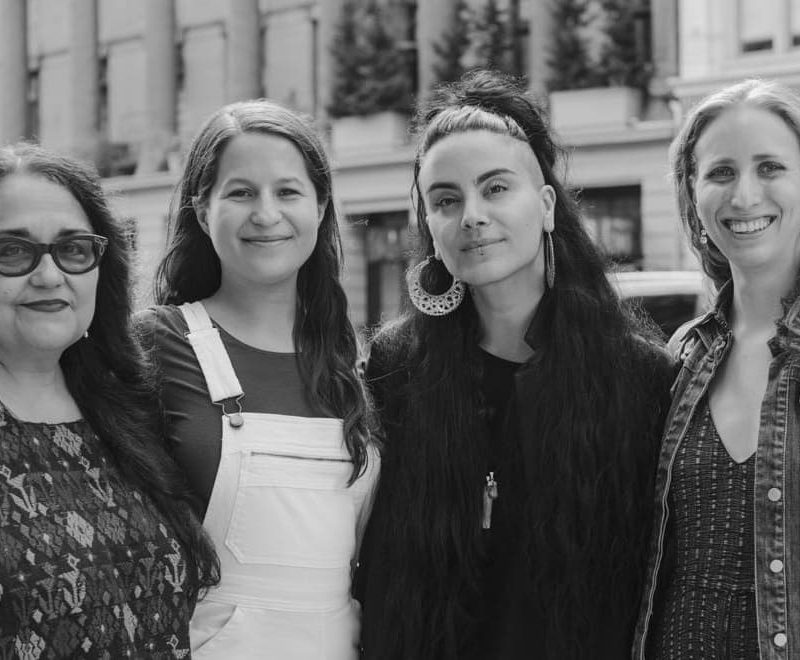Laurie Woolery, Shaina Taub, Sonya Tayeh, and Andrea Grody on “As You Like It”

Photography by Jacqueline Harriet
August 28th, 2017
Public Works, the Public Theater’s program founded by Lear deBessonet that brings community groups together with theatre professionals to create a production, might be theatre-making of the largest scale in Manhattan, with a cast that numbers around 200 (The Radio City Christmas Spectacular has 150 cast members and a camel). The productions involve taking a classic text, having it adapted and musicalized by the creative team, and then staged for a large number of people, all while walking the line between being accessible and being as artistically ambitious as possible. This year, the production is As You Like It, and it has all women at the helm: director Laurie Woolery, composer Shaina Taub (who also appears in the production), choreographer Sonya Tayeh, and music director Andrea Grody. On a break from rehearsal, the women sat down to give a brief history of their process for the project.
On How It Started:
Shaina: I met Public Works by doing the show Twelfth Night last summer, which was Public Works’ fourth show. When looking at it this year, Laurie Woolery—the artistic director of Public Works—and I paired together to pick and create the show for this summer, which is Public Works’ fifth show.
Laurie: Traditionally, what’s happened with Public Works is that a director and a composer have forged a deep collaboration and, with Lear [deBessonet] and [composer] Todd Almond, they created multiple shows together. Shaina and Kwame [Kwei-Armah] had been working together. So, when the opportunity was presented to me to find a composer, in my mind it was like, “Oh, they’re paired up. I really want to work with a woman composer, and so who’s it going be?” And then they like, “Well, do you want to work with Shaina?” and I was like, “Yes, of course.” I was so excited that I even could have the opportunity to work with Shaina because I was such a huge fan. So we were already plotting while Twelfth Night was happening, going, “Okay, this is what we need to think about,” and so we hit the ground running. It was really just trying to find out which play we wanted to do. It was in dialogue with Oskar that we had a couple options, but landed on As You Like It for a variety of reasons. I feel like the center question that we kept asking ourselves was, “What can a production of As You Like It look like, that only Public Works can do?” Public Works became the third collaborator in the room as we were reading plays and talking about what play could best serve our community.
Shaina: We were putting together our dream team for the summer and we all were dying to work with Sonya. It worked out that she could come on board as the choreographer.
Laurie: It was like, “Sonya’s not going to do a Public Works show. She’s all famous and busy.” When we talked on the phone, Sonya was like, “Oh, no, totally. Public Works is me, it’s where I come from.” I remember that conversation really well.
Sonya: Yeah, and then you were like, “Can you come tomorrow?” Just sit through the run through. And I walked into rehearsal and saw a sea of amazingly colorful people and was really intrigued and wanted to be a part of it immediately. It was very inspiring to watch.
Laurie: I was also really moved by the conversation that we had when you said, “I am Public Works,” like, “I know where your community is coming from.” Because you were raised in Detroit. And you were talking about how you came late to being an artist.
Sonya: Yeah, and city life is not always the easiest life, and you’re searching for a type of embrace, an acceptance, and you feel out of place and like you’re having to catch up when you start a little bit later. I feel like what I could offer to that type of rehearsal process is not technical dance terms, it’s human terms, which is just how to feel in the process as opposed to pressuring the idea of steps. It’s more about life experience and the scope of the show, what we’re trying to achieve. So I feel like that comes naturally to me.
Laurie: It was also very important to have representation. I wanted to make sure that there’s diversity and that our community can see themselves in multiple aspects of this work, not just as a performer. Being a person of color, it was very important for me to have you step into that [role] for our community and for our young women to be able to say, “Oh gosh, I could do that. I could be a choreographer if I wanted to. That’s another option.” Or, “I could be a composer. That’s another option that’s available to me.” Then our delicious fourth team member…
Shaina: I’ve done a lot of music directing my own work, just because it seemed like the easiest option at the time. I’m specific about what I want and it’s just sort of been out of necessity. Last year, in Public Works, I music directed as well. I was wearing so many hats and I started to drop them. It all went fine, but I was just really craving that collaboration with an outside perspective who has so much musical knowledge and skill on their own. They can bring qualities out of the music that it would never have occurred to me because I’m so inside of it. Also, so they can be in a leadership role in the room, so I can kind of sit back and get perspective on the writing. I was looking for that. Andrea and I have a mutual friend, Dean Sharenow, who’s a musician and music contractor, and he was like, “You have to meet my friend Andrea Grody. She’s such a badass. She’s amazing.” We met up and I was like, “Yes, she is a badass. Yes, she is amazing. 100%.”
Laurie: Literally, cut to the next day, Shaina’s like, “I found our person.” We are spoiled by Andrea because she stepped in so seamlessly. I was a little worried about it because there is a relationship that the community gets with the person that’s teaching the music. I thought Todd very much had that connection and Shaina had that connection last year. I was like, “Okay. Let’s see.” Andrea just jumped in with both feet. What I also love is that she doesn’t dumb it down. She talks to our community—that’s the thing all of these women do—the generosity of spirit that they bring into the room and that they share with our community and that they keep imbuing with them over and over and over. It has been so inspiring. Of course, that’s what the work demands, but you don’t always get it. It’s a rare combination. I can be like, “I don’t have to worry about this at all.” Or about choreography. As a director, I like to be up on my feet. I like to be finding out what the physical language is with the actors, but I have given over a lot to Sonya in a way that’s just full faith because I feel safe. I witness the community being safe.
Andrea: Dean emailed Shaina because I asked him to. I was like, “Can you introduce me to Shaina? She’s the next big thing.” I remember exactly where I was when I got the email from you, “Do you want to do Public Works?” I jumped down the street. I was like, “Ah! It’s Public Works!” I was so excited because that’s what I wanted to do.
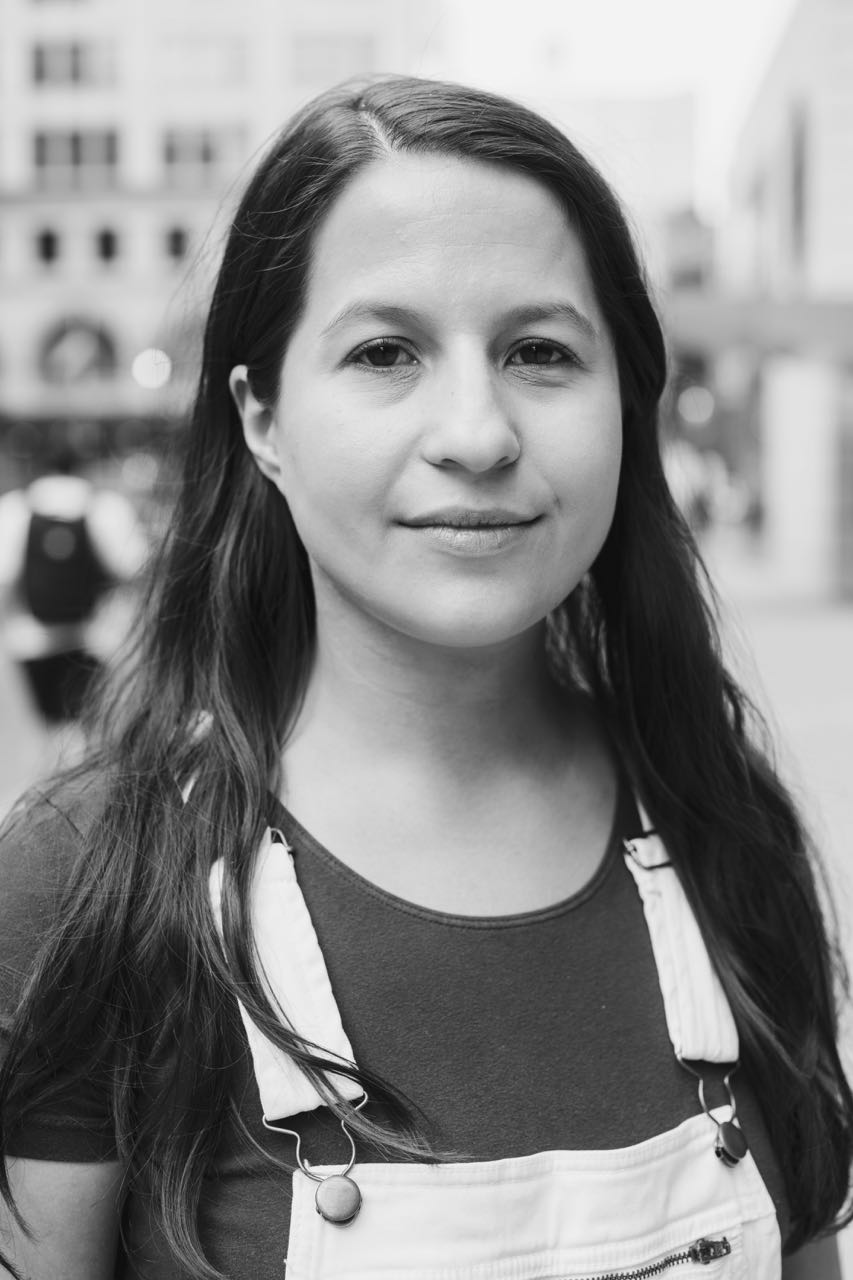
On Being in the Rehearsal Room:
Andrea: What’s great about Public Works is we’re making a good show and we’re doing all the theatre things, but the core of this experience is about joy. Not every show is rooted in joy the way that Public Works is, and it’s nice to know the foundation of it is, “Where is the joy?” It makes it so much easier to come at everything because that’s a great place to start. It’s fun working with the community because all professional artists have different backgrounds as well. Speaking the language of music is tricky for so many people, and I imagine it’s similar with choreography and even with text. It’s really the same working with anyone—it’s just figuring out the way that they use the language. We’re all musicians, we’re all artists in our own way, so it’s fun finding new ways.
Laurie: It’s the ambition, also. Public Works is about radical joy, but we’re part of the Public Theater, so it’s also about radical excellence. It’s not about dumbing down theatre for anybody. It’s about what is the most excellent theatre—play, musical, choreography, music direction, direction—that we can give our community, because they deserve it. If Meryl Streep was in the room, we’d be doing the same exact thing. I don’t ever want to lose that ambitious appetite that Public Works has to create an amazing play. It’s that level of excellence that we’re all demanding of ourselves in the work and that we’re demanding of the community, which is, I think, why we are getting the focus and the concentration and people tracking their entrances and exits in a way that I haven’t experienced before. I feel like it’s the team.
Something that’s very simple, but when we say, “Okay friends, let’s gather and get to the floor,” people stop conversations and get there. That traditionally has been many, many, many, many times asking and trying to get people to quiet down and focus. Imagine a room of 200 people every night, and we just have to ask once and people are focused. It has been the most jaw-dropping thing for me and I’m always humbled by. It’s like, “Oh, they’re ready. I got to be ready.”
Andrea: I feel very grateful to the four years behind me that sort of built up this process. I can feel that in the room—people who’ve been there before and they know the deal. The community raises the bar. Every day I raise the bar because the community has met me and I’m like, “Well, I got to keep going higher.” It’s so exciting to see. Every time they say, “Let’s do this,” they go. It’s like, “All right. Let’s keep going.” It’s always going up. It’s really fantastic.
Sonya: It’s also knowing there’s always room for growth. They’re human beings that want to learn. That’s what we all want to do in life. Sometimes, in our professional life, it can feel like you can’t get to that groove anymore, or it’s too professional, when really the root and the basis of it is learning and being in a creative process.
I always say this, but it’s so true to me: you can’t teach desire. You can’t teach a want, a dream. For me, that’s all I ask for when I’m teaching movement. Just be open to wanting it. Be open to looking at yourself and knowing that you can do it, because all the other mechanical stuff I can fix. They’re so willing. We just try things. I never walked in saying, “Well, I’m here, so I’m going to try it this way.” I just went in with our creative process for pre-pro and did what I normally do.
Laurie: We don’t know all of peoples’ histories and we don’t know the joy and the trauma and the heartbreak and the success and the lack of opportunity and the lack of access that they’re bringing into the room. What Sonya has done is moving through that wall that comes up when people are moving or when people are singing or when people are acting, to just stay open. You say it all the time, and you’re saying it to them, but you’re also saying it to me. It’s like, “Stay open. Stay open.” Just acknowledge this is where we’re at and we’re all learning this together, and I think that has also been a really huge shift for everyone in the room. Stay open to the discomfort, because we’re going to come through it. We’re going to come out the other side in a better, richer, deeper place. It’s kind of like holding onto its hand like, “Okay fear, we’re dancing today. Okay fear, we’re singing harmony even though I don’t know what that means. Okay fear, I’m going to have to hold someone’s hands and say these Shakespeare lines that don’t necessarily feel authentic to me, but I’m going to stay open to find out how I’m going to find my truth in this.” That’s what’s so moving, is watching them own the story and own their place on that stage.
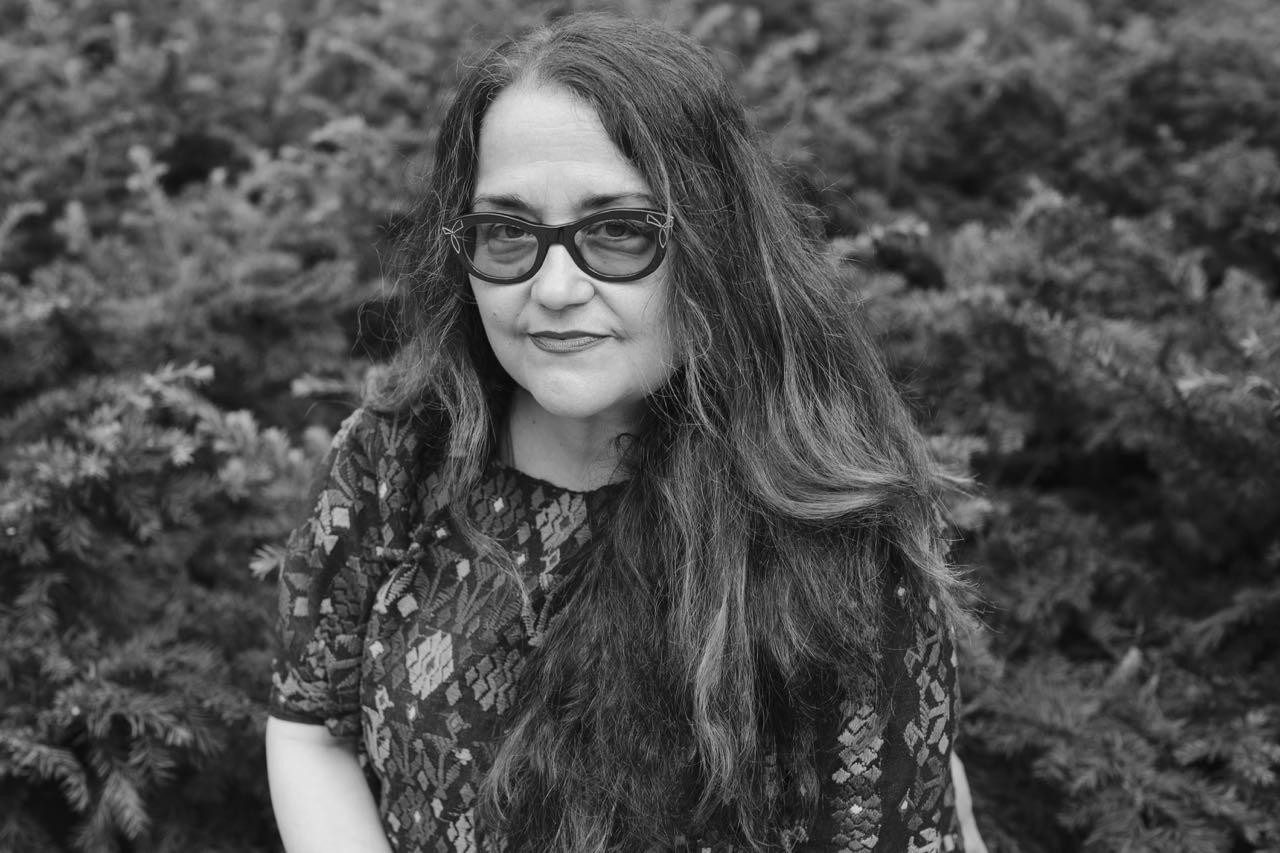
On the Guiding Principles Behind the Adaptation:
Laurie: A lot of it went into just trying to figure out what play to do and what we had done in the past and what could we do that was different. I think I wrestled a lot with As You Like It because of the similarities with Twelfth Night of a female being in men’s clothing. That’s a personal thing that I was struggling with.
I think the pillars, for me, were what play can we pick where community is at the heart and the soul of the telling of the story. It was the election. It was rights being assaulted—LGBTQ, immigrant, female—and it was the refugee situation. All of that was alive when we were meeting once a week. We would bring that in and we would talk about our lives and we would talk about what’s going on in the world and how helpless we felt. I think a lot of what we talk about in Public Works is about a citizen artist. What can you do to contribute? What can the arts do to contribute? It’s about owning your story and telling your story. Those were with me as we were moving through.
Shaina: Also, the line between reality and fantasy was really big for me. Reality and magic and where those meet. There’s the fantasy of the role we feel like we have to play in life and the idea of “all the world’s a stage,” and then we’re all kind of moving through life with the prescribed set of behaviors that we feel are put upon us, and in our journey as people we strip that away and figure out who we really are. Trying to lessen the gap between how the world sees you and how you see yourself. [In As You Like It] both in the macro way—in terms of all the refugees that are out in Arden that have been banned from the court—and then with Rosalind, who’s spent her whole life playing this role of this women she felt she had to and stripping that away to see what’s really underneath.
At the time, I was like, “Oh, I just did Viola, the woman dressing up as a man,” but then I realized the fundamental difference between the two is that for Viola, it takes her the whole show to realize what dressing up as a man does for her and the strength in that. She’s like, “Wow, now I’m a man. I have access to all these other emotions.” Then her realization that, “Oh, actually I never needed any of that. It was in me all along.” Rosalind, from the start, knows what being a man can afford her. Her first thought when she’s banished is, “I want to be a man,” because she knows. For her, it’s more the journey of what she uncovers later.
Laurie: Yeah, living behind the mask, whether it’s the mask of a man or whether it’s the mask of the court and the role she has to play as woman. There’s a certain kind of woman she’s expected to be in the court. Whereas, when you’re in Arden—this was the other thing we kept talking about—it’s where you go to work your shit out. If you are a refugee and you’re stripped of everything, or if you’re just a human being and you’re stripped of all of the things that we have—our clothes, our home, our old job, our identity, our title, and we’re thrown out—what are we left with? How do we thrive or fail in that?
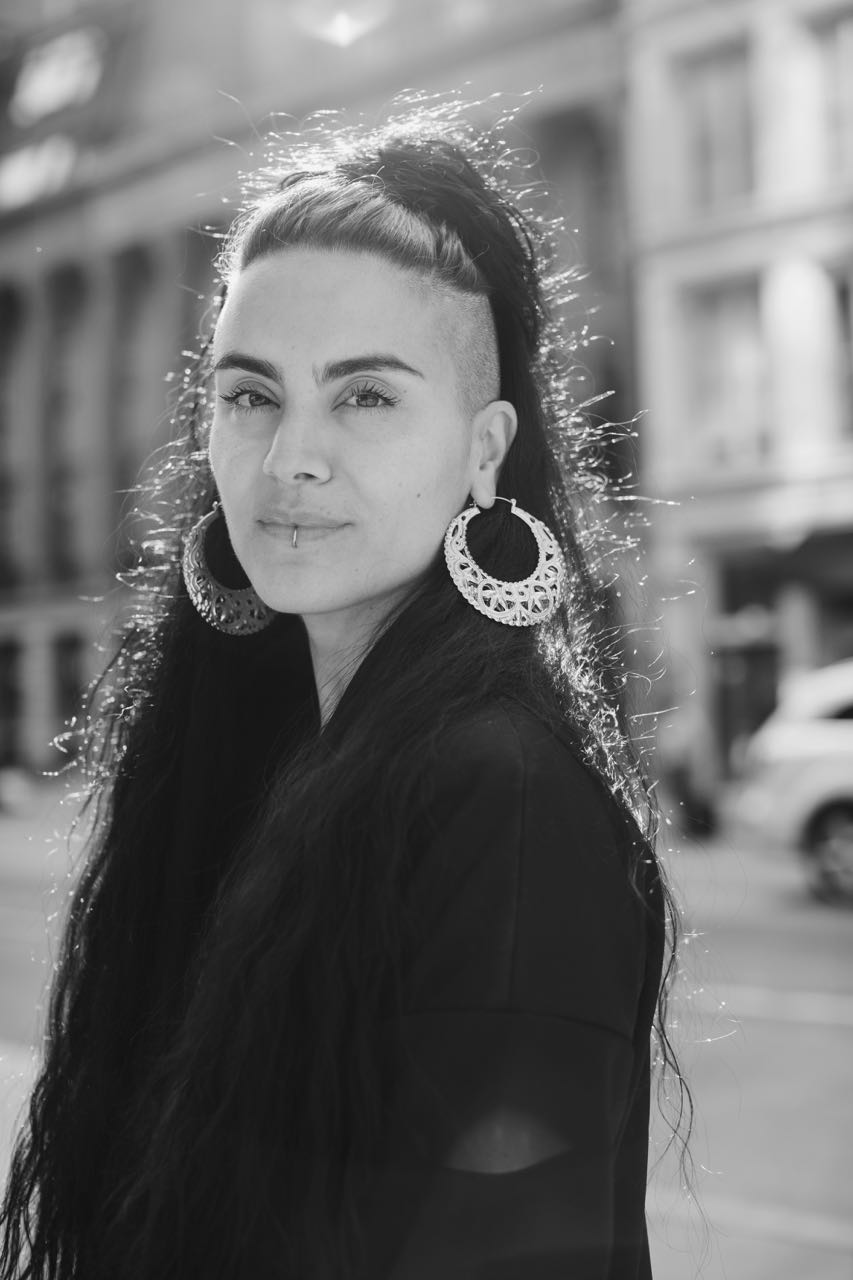
On putting ideas and themes into practice:
Sonya: Dealing with my own trying to peel out of what I need to peel out of, I’m utilizing that all the time when I’m looking at them trying to get somewhere. I’m using it myself too. I’m seeing them. As they’re shutting, I’m shutting. There’s a lot of gestures that feel like surrender, like a surrender to. There’s a lifting of the spine that feels like a strength or a focus. There’s a suspension of a want or a need. Those little things. It may not be totally obvious to the audiences’ eye, but we talk about it in terms of breath. Even when I’m telling the community to just be open. It’s to settle myself and embrace myself. If I’m trying to embody that with myself, I will be able to be sincere in my approach to commanding that, demanding that in a room.
Shaina: Last fall, when we were outlining this and trying to think of what would New York City need to hear on Labor Day weekend 2017—because it’s not only so specific for this context, people-wise, but it’s for a certain weekend—I was at the Women’s March in DC and one of the big chants was, “No hate, no fear, everyone is welcome here.” Writing the song “Under the Greenwood Tree,” which is an original lyric, but the hook is inspired by the Shakespeare song within the initial play, I just took down the line and rebuilt around it. I thought, “Oh, this cord’s an invitation.” It’s saying, “Come on in.” That chant was in my mind of, “All are welcome here.” Now it’s made its way into the lyrics that say, “Do not fear, all are welcome here.” It was just hanging across the room. It feels dramaturgically correct for the moment, but it also, I hope, feels resonant for our larger moment.
Laurie: One other thing that we kept wrestling with is, “Why does Rosalind not reveal herself when she gets to Arden?” No one’s stopping her. He’s there. She knows he digs her. Why is she not like, “Hey,” and they go live happily ever after? One specific rehearsal we spent just getting really transparent about ourselves and how we block love. There’s one specific song, “When I’m Your Wife,” it takes me back to that day and how vulnerable we got with each other about why love is scary and really understanding and stepping into Rosalind’s shoes in that moment of going, “Here’s a woman who has been abandoned by men and society and has not been accepted for who she is and how she has to stay open to this opportunity of love that’s presented to her.”
Sonya: And take a chance.
Laurie: The process of writing that and staging that and now witnessing that circles back to those moments when I’ve closed myself off.
Shaina: One big theme of the show is education and getting emotionally educated. I feel like, oftentimes, treatments of Rosalind are that Rosalind is so brilliant and amazing and she just has to fix Orlando and get him ready for love. That is true, but it’s not the whole story. Rosalind also has some work to do on herself. I think, for Rosalind, it’s much easier to project onto other people and say, “Ah, let me fix what’s wrong with you.” It takes her the play, to end that ultimate moment, the night before she gets married. We’ve inserted a soliloquy for her that’s not in the play, because in the original play, we get no moments alone with her. By fixing Orlando and teaching him it’s like, “By my pupils, I’ve been taught.” The teacher becomes the student, and I think part of going to Arden is realizing how much you have to learn, and that’s also part of going to Public Works. I feel like that’s a thing that’s really mirrored that’s in this play.
My biggest lesson at Public Works is just listen, listen, listen. I have so much to learn. I play Jaques, and at the end, when everyone leaves, there’s an epilogue. It won’t give too much away, but Jaques, at the end, when everyone runs off, says, “There’s still much matter to be heard and learned out here.” That’s always how I feel about Public Works.
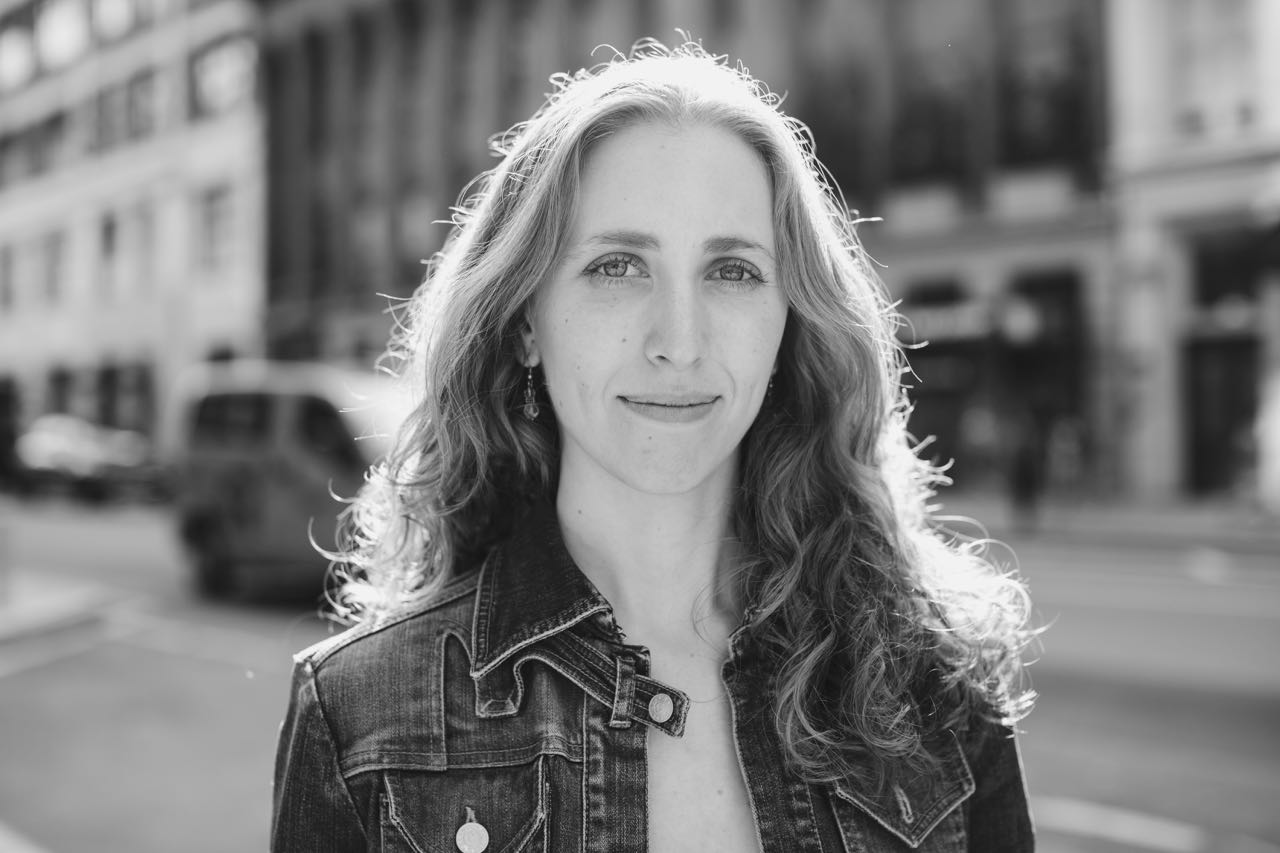
Andrea: I never had trouble relating to the idea that Rosalind wouldn’t reveal herself because I feel like I’ve spent a lot of my personal life, and a lot of my professional life over the past couple years, stripping down. Once I felt like I figured out the things I had to do to be a professional, I was like, “Okay, well now how do I do that and also be myself?” Everything that we’re talking about in the show—stripping down, being yourself—mirrors the journey that I’m continually on.
Shaina: It’s like fear standing in our way. A guiding principle for us is there’s a quote hanging in the room, and it’s the James Baldwin quote, “Love takes off the mask that we fear we cannot live without and know we cannot live within.” That just feels so right within our show and the program. You hold on to these walls you have because it just feels familiar. I can’t live without them, but you know underneath you can’t live with it. Both are always true. Every day I go through that process.


